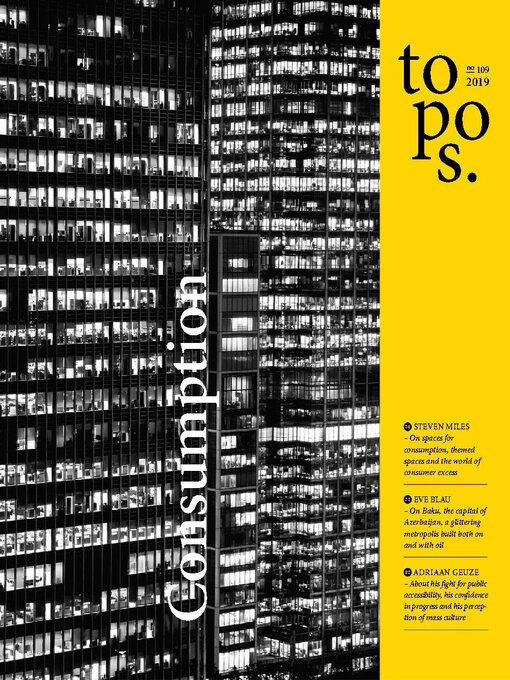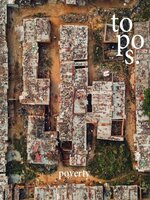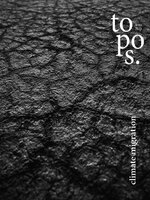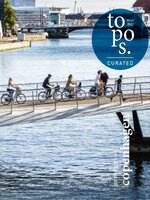Topos is a must-have for successful landscape architects, planners, urban designers and architects all over the world.The monothematic issues provide a global overview of innovative projects, new developments and trends in the profession. Be part of the worldwide community of Topos readers!
COVER
Ghost Colony
“LET’S FACE IT: WE FUCKED IT UP. SO, IT WILL BE US WHO FIX IT.” • How do cities solve critical issues – from security to inclusiveness, from urban growth to health, from mobility to climate change? It is the ambition of mayors, influencers, public figures, forward-thinking businessmen and activists that matters. The ambition to drive change and to shape cities for the better. We need city changers on all levels and in all aspects of urban life who really dare to be inconvenient.
ZUS: Elma van Boxel and Kristian Koreman • Elma van Boxel and Kristian Koreman studied landscape architecture, architecture, urbanism and philosophy and are the founding partners of ZUS [Zones Urbaines Sensibles]. As an international and award-winning practice ZUS is pushing the boundaries through unsolicited projects. As visiting professors at Syracuse University New York they teach the Climate Utopia Studio.
Dirk Sijmons • Dirk Sijmons is a landscape architect trained as an urbanist. He was one of the founders of H+N+S Landscape architects. He was appointed first State Landscape Architect of the Netherlands (2004- 2008) and held the chair of Environmental Design (2008-2011) and of Landscape Architecture (2011-2015) at the TU Delft. In 2017 he was awarded the IFLA Sir Geoffrey Jellicoe Award.
Vienna • Time and again Vienna is voted one of the most livable cities in the world. The city’s approach to urban development, which focuses mostly on urban regeneration, affordable housing and a well-developed public transport system, has successfully made the quality of life of its inhabitants a priority. Vienna is growing, and in a healthy way. Yet it still has two speeds – sometimes blessedly slow and sometimes travelling in the fast lane.
In a delirious frenzy • Higher, better, faster – we live in a capitalist economy, one that fosters over-consumption; a modern economy that has to continuously step up production to survive. This vicious circle impacts the life of mankind and the whole biosphere. The changes that population growth and consumer capitalism cause on our planet are the theme of “Landscape of Consumption“, a film by the English photographer Karl Davies. The scenes in his production are mainly so depressing because he neither glosses over nor edits anything – he just reflects our everyday life.
Landscapes of Consumption • Our landscapes are first and foremost spaces for consumption. They are an urgent testament to a world of progress unfulfilled, that human beings have come to define through their ability to use up and lay to waste. Such spaces are both spectacular monuments and yet living, breathing question marks that hang over our very existence. This world of manufactured places has reached something of a turning point. Or has it? At one level we appear, albeit painfully slowly, to be recognising the impact of consumption on the environment, but at another our urban and rural landscapes are more indebted to the world of consumer excess than ever before. Where do we, where can we, go from here?
Oil and Urbanism • Baku, the capital of Azerbaijan, is the oldest oil extraction site still in operation, and one of the most rapidly changing urban environments in the world today. Baku experienced its first oil boom in the 1870s. Since that time, the extraction, production and commodification of both oil and urbanism have been intertwined – economically, politically and physically – in the fabric and culture of the city. The long history of those entanglements gives us access not only to the foundations of the oil industry and...

 N. 130
N. 130
 N. 129
N. 129
 N. 128
N. 128
 N. 127
N. 127
 N. 126
N. 126
 N. 125
N. 125
 N. 124
N. 124
 N. 123
N. 123
 N. 122
N. 122
 N. 121
N. 121
 N. 120
N. 120
 N. 119
N. 119
 N. 118
N. 118
 N. 117
N. 117